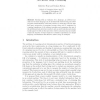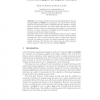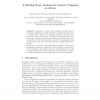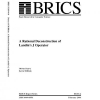127
click to vote
IFL
2005
Springer
15 years 7 months ago
2005
Springer
Polytypic functional programming has the advantage that it can derive code for generic functions automatically. However, it is not clear whether it is useful for anything other tha...
IFL
2005
Springer
15 years 7 months ago
2005
Springer
The iData Toolkit is a toolkit that allows programmers to create interactive, type-safe, dynamic web applications with state on a high level of abstraction. The key element of this...
127
click to vote
IFL
2005
Springer
15 years 7 months ago
2005
Springer
Abstract. This paper considers the use of dependent types to capture information about dynamic resource usage in a static type system. Dependent types allow us to give (explicit) p...
IFL
2005
Springer
15 years 7 months ago
2005
Springer
Abstract Starting with an evaluator for a language, an abstract machine for the same language can be mechanically derived using successive program transformations. This has relevan...
109
click to vote
IFL
2005
Springer
15 years 7 months ago
2005
Springer
In programs written in lazy functional languages such as for example Clean and Haskell, the programmer can choose freely whether particular subexpressions will be evaluated lazily ...
110
click to vote
IFL
2005
Springer
15 years 7 months ago
2005
Springer
Performance of generic array programs crucially relies on program specialization wrt. shape information. Traditionally, this is done in a rather adhoc fashion by propagating all sh...
IFL
2005
Springer
15 years 7 months ago
2005
Springer
117
click to vote
IFL
2005
Springer
15 years 7 months ago
2005
Springer
With-loops are versatile array comprehensions used in the functional array language SaC to implement universally applicable array operations. We describe the fusion of with-loops a...




